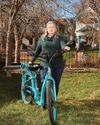
WHEN ALBERT DIAZ, then 41, took his seat in the Social Security Administration's hearing room in Wilkes-Barre, Pennsylvania, in October 2011, he had to lower himself onto his left buttock to avoid stabbing pain in his right leg. His dominant arm, the right one, was locked in a brace to keep it from curling in toward his body. He shook uncontrollably, a side effect of an electrical stimulation device implanted in his spinal cord to manage relentless pain. Three years earlier, Diaz had fallen backward three stories down an elevator shaft while working as a maintenance director in a luxury apartment building. Since the accident, his family of nine had relied on his wife's teaching salary. His application for federal disability benefits was denied, and after waiting a year for a hearing, he'd come to appeal that decision before an administrative law judge (ALI).
During the half-hour hearing, Diaz told the judge about his pain and how his family has to help him bathe, get dressed, and shave. Following his testimony, a vocational expert spent a few minutes testifying about what someone in Diaz's condition could do for work. The conversation went like this: The judge asked the expert to imagine a hypothetical person of Diaz's age, education, and work experience. Now, the judge said, imagine that this person can do light work, with limitations. "There would be a bilateral lower extremity push/pull limitation," she clarified, "occasional climbing, balancing, and stooping but never on ladders, never kneeling, crouching, or crawling."
The judge then asked the vocational expert whether there were any jobs suited to such a person. Considering only the factors the judge had described, the expert answered that the person could be a "greeter/host," and indicated that there were about 200 or 300 such jobs in northeastern Pennsylvania. Or they could be a "price marker"-who attaches price labels to merchandise-1,100 to 1,200 jobs.
هذه القصة مأخوذة من طبعة September/October 2022 من Mother Jones.
ابدأ النسخة التجريبية المجانية من Magzter GOLD لمدة 7 أيام للوصول إلى آلاف القصص المتميزة المنسقة وأكثر من 9,000 مجلة وصحيفة.
بالفعل مشترك ? تسجيل الدخول
هذه القصة مأخوذة من طبعة September/October 2022 من Mother Jones.
ابدأ النسخة التجريبية المجانية من Magzter GOLD لمدة 7 أيام للوصول إلى آلاف القصص المتميزة المنسقة وأكثر من 9,000 مجلة وصحيفة.
بالفعل مشترك? تسجيل الدخول

HOG WILD
The scandalous reason meat prices have skyrocketed

ALL WALKS
Limiting cars in cities can help disabled people, too.

REMIGRATION
How Trumpism is following the far right in Europe toward mass expulsion of immigrants

SETTLING THE SCORE
A pop psychology book is considered the definitive trauma text. But what if it's leading survivors down the wrong path?

Positive Spin
People with e-bikes drive less, pollute less, parkinglots-and that's only part of why cities and states are embracing them with gusto.

Cradle and All
The devastating cost of Utah's thriving adoption industry

THE BILLIONAIRE WHO NEARLY BROKE NEWPORT
TRUMP MEGADONOR STEPHEN SCHWARZMAN'S EXTREME MANSION MAKEOVER IS DRIVING HIS NEIGHBORS NUTS.

THE SECRET PLAN TO STRIKE DOWN US GUN LAWS
AND THE COP-TURNED-PASTOR AT THE CENTER OF IT ALL

GOOD NIGHT AND GOOD LUCK
Election Day inside a bustling broadcast newsroom that no longer exists

MASTER OF DISASTER
Trump won’t confront the climate crisis. He’ll feast off it.